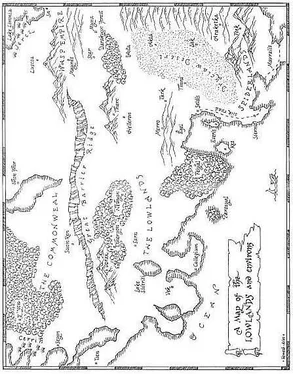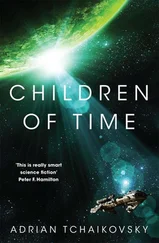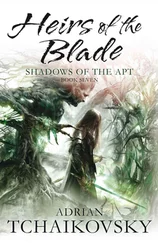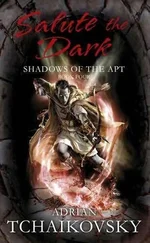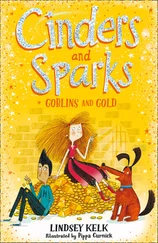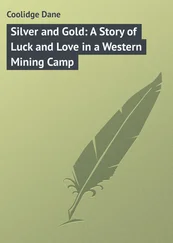Adrian Tchaikovsky - Empire in Black and Gold
Здесь есть возможность читать онлайн «Adrian Tchaikovsky - Empire in Black and Gold» весь текст электронной книги совершенно бесплатно (целиком полную версию без сокращений). В некоторых случаях можно слушать аудио, скачать через торрент в формате fb2 и присутствует краткое содержание. Жанр: Фэнтези, на английском языке. Описание произведения, (предисловие) а так же отзывы посетителей доступны на портале библиотеки ЛибКат.
- Название:Empire in Black and Gold
- Автор:
- Жанр:
- Год:неизвестен
- ISBN:нет данных
- Рейтинг книги:4 / 5. Голосов: 1
-
Избранное:Добавить в избранное
- Отзывы:
-
Ваша оценка:
- 80
- 1
- 2
- 3
- 4
- 5
Empire in Black and Gold: краткое содержание, описание и аннотация
Предлагаем к чтению аннотацию, описание, краткое содержание или предисловие (зависит от того, что написал сам автор книги «Empire in Black and Gold»). Если вы не нашли необходимую информацию о книге — напишите в комментариях, мы постараемся отыскать её.
Empire in Black and Gold — читать онлайн бесплатно полную книгу (весь текст) целиком
Ниже представлен текст книги, разбитый по страницам. Система сохранения места последней прочитанной страницы, позволяет с удобством читать онлайн бесплатно книгу «Empire in Black and Gold», без необходимости каждый раз заново искать на чём Вы остановились. Поставьте закладку, и сможете в любой момент перейти на страницу, на которой закончили чтение.
Интервал:
Закладка:
Noles Mender had gone quiet, was staring straight ahead with his lips pressed tightly together, but Sfayot could not drag his ravaged gaze away. He saw face after face, the men and women of the Commonweal, each locked in a final expression of fear, shock, pain or grief. He saw Mantis-kinden and Dragonfly swordsmen lying dead, the stained earth about them speaking all that needed to be said about their last moments. He saw the broken, husk-like bodies of insects: saddled dragonflies with shattered wings, the curled bodies of wasps riddled with arrow-shafts, fighting mantids with spread limbs, their gorgeous, glittering eyes caved in, their killing claws broken. In the field’s centre a burnt-out automotive smouldered still. A small team of engineers, faces swathed with scarves against the reek, laboured over it, trying to salvage anything of value. And everywhere there were the flies: finger-long, torpid black flies, that coated the dead like tar and arose, as Noles’s party passed, in glutted, blood-addled clouds.
Once they had passed through the battlefield, they found the army camp, where Noles’s contact was. The Beetle was obviously anxious to deliver his message and be gone, and the soldiers were likewise keen to return to the delights of Shona. Sfayot bid them farewell and took his last few jugs of wine to see what they might buy.
He had expected fierce celebration, Shona in miniature, but there was none. The battle was too recent, and too many men were in no fit state to cheer. He guessed that much of the army must be off routing the remaining Commonweal forces, for fully half the tents in that camp were crammed with the Imperial wounded. Battlefield surgeons, Wasp men with lined faces and steady hands, were working their way through them with fatalistic patience. Elsewhere were tents of the Mercy’s Daughters, caring for those that the surgeons had not reached yet, or had given up on. The Daughters were not part of the army, were not officially even tolerated by the Empire, but any general that turned them away would lose the love of his men. These women, Wasp women and women of a dozen other kinden, were often the last sight and comfort that a wounded soldier could hope for. Their faces, as they went from pallet to pallet, were calm and fixed, their voices low. Around them the wounded cried out, or begged, wept, slept or died.
Sfayot spilled a lot of time and wine finding someone who might know what he wanted. In the end he found a half-dozen Thorn Bug-kinden Auxillians at the back of one of the Daughters’ tents. They were engineers, he understood, and from the look of their shiny burns and scars they had caught the rough end of their trade. He had the impression that the greater part of their company was dead. They were hateful, hideous, spiky creatures, crook-backed and hook-nosed, and the Empire regarded them with as little love as it did Sfayot’s own people. He produced for them his last jug of wine, though, and they passed it around in solemn silence. For them it was a taste of distant, distant home, that briar-riddled place that the Empire ruled only loosely, but tightly enough to conscript luckless men such as them. Judging from their wounds, at least half would likely never return there.
Two of them said they knew Sergeant Ban, in no uncertain terms. The sergeant was a gambling man, but not insofar as it extended to paying debts owed to lesser kinden. Sfayot guessed that the man had been gaming with the Thorn Bugs because nobody else would take his marker. They knew him, yes. Had he been through here? Yes, twice.
‘Twice?’ Sfayot frowned.
‘Once out, once back, with a full string of Dragonfly-kinden slaves, good ones too, all decent-looking women.’ A Thorn Bug leer has no equal.
‘All Dragonfly-kinden?’ Sfayot pressed, dismayed that he had managed to miss Ban entirely. ‘There was one, perhaps, a girl of my kinden. White hair.’
They shook their malformed heads. They had got a good look at those women, yes they had. They would remember if one of them had been something as lowly as a Roach. Dragonfly princesses, the lot of them, all fit to fetch a good price back in the Empire.
‘A higher price than any Roach-kinden, of course,’ Sfayot said softly. Of course, they agreed, almost laughing at the thought, the last dregs of the jug making their rounds. Who would buy Roach-flesh when that beautiful golden Dragonfly skin was so cheap these days?
And where was this place, to where all the slaves were going? They weren’t sure, but they knew which road the slavers took, and it could only lead to their destination.
Sfayot spent much of the night in thought, and by dawn he thought he understood, for all the bitter taste it left in his mouth. Ban had a quota, and no doubt the Slave Corps set limits on how many charges any given slaver could mind. Sfayot’s daughter, stolen from him on a brutal whim in Nalfers, had been held up to the light and judged unworthy. She had been cast off in favour of the extra coin that a Dragonfly woman might buy.
She might be dead, therefore. She might have been used and cast off, throat slit, into a trench, and not another thought on the part of whatever Wasp slaver or soldier had done it. Or she might have fallen into that great melting pot of unclaimed slaves he was hearing of, and might still be there. Having come this far, what choice did he have?
He set off that morning. He had some coin in his pocket, little enough after giving away most of his stock. His wine was all gone, and he sensed that Malic’s papers would not carry much weight this far out. A lone Roach-kinden had no legitimate business in these places, so he would most likely be executed as a spy if they caught him.
He saw more signs of war on the road, but he felt as though his sensibilities had begun to erode under the relentless visions of trauma. Dead men and women, dead children, dead animals, his eyes slid off them quickly now. He had no more room for horror. Or so he thought.
For he found it. He found where the slaves, these myriad captives of war, were going, and he discovered that there was a little room left, after all, for a kind of horror that a connoisseur might savour as Ferro had savoured his wine.
The Wasps had built a cage, and the cage was like a honeycomb, and the honeycomb was vast, eight-score cells at least, all wooden-slatted walls and a hatch at the top of each. There had been woodland here before, but it had been hacked back for half a mile in all directions, the felled wood contributing to this abomination.
There were plenty of Wasps here: some were arriving, some departing with strings of slaves, others were plainly the custodians of the place. All of them wore the tunics and full helms of the Slave Corps. There was not a regular soldier, not a Consortium factor or clerk or artificer to be seen, but of the slavers there were dozens, stalking about the perimeter of the thing they had built, or walking atop it, looking down on their massed charges. Sfayot waited until twilight and crept closer, trying to find a vantage point to see into the wooden cells.
The sheer size of the construction awed him. They had built cells, and then built more and more, each one borrowing a wall from the last and, as more slaves had come, they had built and built, their labour becoming as mindless and instinctive as that of their insect namesakes. The cells looked to be designed each for perhaps four prisoners, but Sfayot guessed that none held fewer than eight, and many had more. The stench put the battlefield to shame. For that was a smell of death, while this was life, the most wasted, pitiful dregs of life: a sour, stomach-clutching stink of sweat and excrement, fear and despair. The slaves went in, he saw, and if they were lucky some slaver came and took them out. Otherwise, they stayed and some were fed and others starved or grew fevered from wounds, and eventually, he saw, some of them had died, and still their remains remained, because the slavers were working all the time bringing more people in . Every cell he could peer into had at least one collapsed form that did not move.
Читать дальшеИнтервал:
Закладка:
Похожие книги на «Empire in Black and Gold»
Представляем Вашему вниманию похожие книги на «Empire in Black and Gold» списком для выбора. Мы отобрали схожую по названию и смыслу литературу в надежде предоставить читателям больше вариантов отыскать новые, интересные, ещё непрочитанные произведения.
Обсуждение, отзывы о книге «Empire in Black and Gold» и просто собственные мнения читателей. Оставьте ваши комментарии, напишите, что Вы думаете о произведении, его смысле или главных героях. Укажите что конкретно понравилось, а что нет, и почему Вы так считаете.
